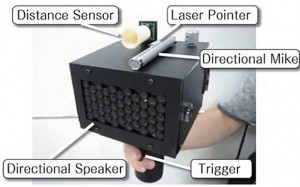News from Iran and Japan
Tuesday's World Events — Posted on March 13, 2012
IRAN – Iran trains female ninjas as potential assassins
Three thousand Iranian women being trained as ninja warriors say they will use their martial arts skills to defend the country if necessary.
Scores of black-clad female “ninja” fighters whose ages range from 5 to 56 are just a handful of 3,000 women in Iran who are being trained as lethal warriors at a school in Tehran.
“We train women to have strength and ability. We have to do everything in our power to protect our homeland,” said Akbar Faraji, who runs the school.
One of the fighters who has been training for over 13 years said, “Our aim is for Iranian women to be strengthened and if a problem arises, we will definitely declare our readiness to defend our Islamic homeland.”
Iran has proclaimed advances in nuclear technology, including new centrifuges able to enrich uranium, a move that has heightened its confrontation with the West over suspicions it is planning to make nuclear weapons.
On February 17th, Britain’s Foreign Secretary, William Hague, told The Telegraph that Iran’s pursuit of weapons of mass destruction could trigger a “new Cold War.”
JAPAN – Device to silence incessant talkers created by Japanese scientists
TOKYO | A device that silences incessant talkers or mutes people who talk too loudly has been created by Japanese scientists.
Dubbed the SpeechJammer, the prototype device takes advantage of psychologists’ discovery that it is virtually impossible to speak when your own words are being played back to you with a delay of a fraction of a second.
The gadget has been devised by Kazutaka Kurihara, a researcher at the National Institute of Advanced Industrial Science and Technology, and Koji Tsukada, a professor at Ochanomizu University in Tokyo, and is remarkably simple.
The hand-held device consists of a microphone that is pointed at the speaker and records that person’s voice. It then transfers the sounds to a speaker and replays them back in the same direction with a delay of about 0.2 seconds.
The microphone and speaker are directional so the device can be aimed at a speaker from a distance, like a gun.
“The system can disturb remote people’s speech without any physical [dis]comfort,” the scientists said in a paper reported in the MIT Technology Review.
Their tests also uncovered some unexpected findings, such as that the gun is more effective when the delay varies in time. It also works better when the speaker is reading aloud rather than giving a spontaneous monologue.
Their research also revealed that it has no effect on meaningless sound sequences, such as “aaaargh.”
Kurihara and Tsukada have not spelled out the commercial potential for their invention, but did list some possible applications.
They said it could be used to maintain silence in public libraries and to “facilitate discussion” in group meetings.
“We have to establish and obey rules for proper turn-taking when speaking,” they said. “There are still many cases in which the negative aspects of speech become a barrier to the peaceful resolution of conflicts.”
JAPAN – Construction Company Aims to Launch space elevator by 2050
 Japanese construction company Obayashi wants to build an elevator to space and transport passengers to a station about a tenth the distance to the moon.
Japanese construction company Obayashi wants to build an elevator to space and transport passengers to a station about a tenth the distance to the moon.
The elevator would use super-strong carbon nanotubes in its cables and could be ready as early as 2050, according to Tokyo-based Obayashi.
The cables would stretch some 60,000 miles, about a quarter the distance to the moon, and would be attached to Earth at a spaceport anchored to the ocean floor. The other end would dangle a counterweight in space.
The elevator would zip along at 125 mph, possibly powered by magnetic linear motors, but would take about a week to get to the station. It would carry up to 30 people.
Up above, the space station would have living quarters and lab facilities. Solar panels connected to the station would generate electricity that would be transmitted to the ground.
NASA has also investigated space elevators, awarding $900,000 in 2009 to LaserMotive for developing a laser-powered robotic climber. Aside from the tremendous technological hurdles involved, while space elevators could significantly reduce space-related costs compared with rocket launches, the infrastructure could cost billions to build.
“At this moment, we cannot estimate the cost for the project,” the Yomiuri Shimbun newspaper quoted an Obayashi official as saying.
“However, we’ll try to make steady progress so that it won’t end just up as simply a dream.”
(The news briefs above are from wire reports and staff reports posted at Telegraph.co.uk on Feb. 18 and March 2, and at CNET.com on Feb. 23.)


